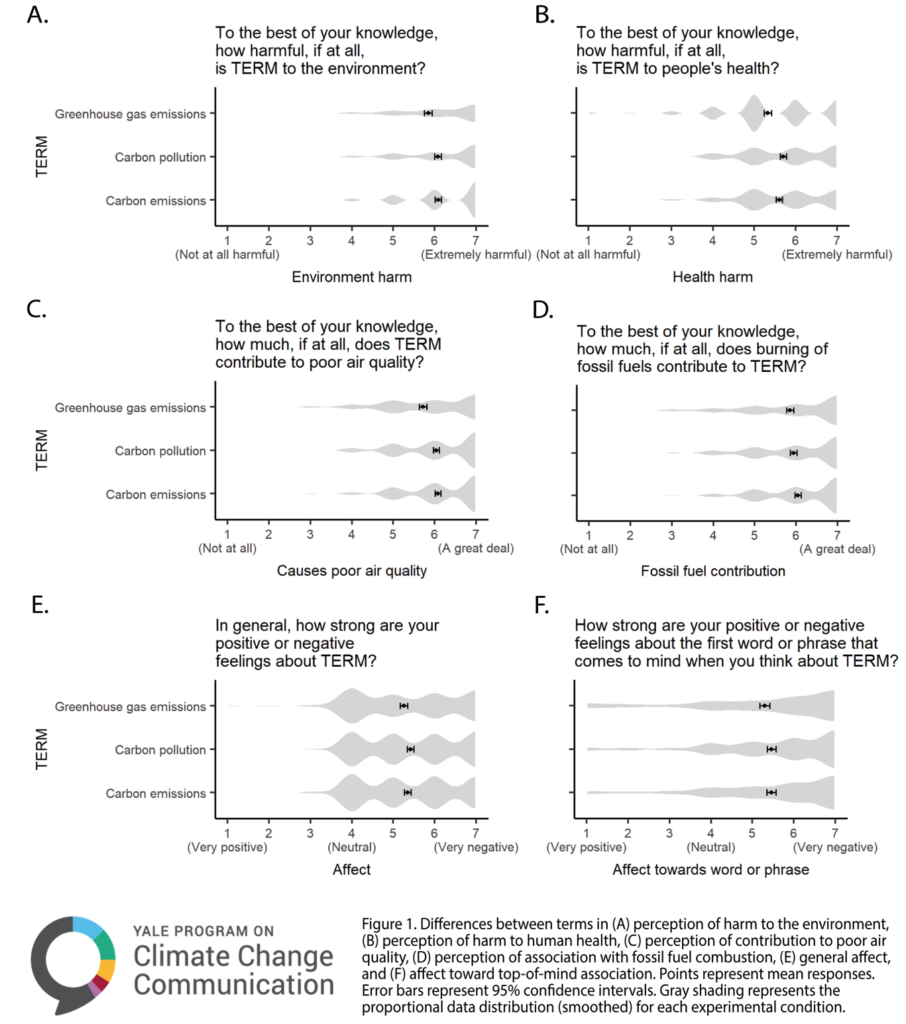Peer-Reviewed Article · Jan 24, 2023
Evaluating terms Americans use to refer to “carbon emissions”
By Francis Commerçon, Matthew Goldberg, Karine Lacroix, Jennifer Carman, Seth Rosenthal and Anthony Leiserowitz
Filed under: Messaging and Beliefs & Attitudes

We are pleased to announce the publication of a new article, “Evaluating terms Americans use to refer to ‘carbon emissions’” in the journal Environmental Communication.
In communication, it is important to use terms that are understood by and resonate with one’s audience. Word choices can influence people’s thoughts and feelings, policy support, and even behavior. In climate change discourse, greenhouse gas emissions, carbon emissions, and carbon pollution are often used interchangeably to refer to carbon dioxide and methane emissions, the main causes of global warming. In this study, we investigated how Americans interpret and respond to these different terms.
The experiment randomly assigned respondents (N = 2,859) to one of three conditions, with identical questions except for the key terms: greenhouse gas emissions, carbon emissions, or carbon pollution. The outcomes we measured included affect (i.e., good or bad feelings associated with the term), beliefs about environmental and health harms of each term, and respondents’ understanding of the links between fossil fuels and climate change. We also collected respondents’ top-of-mind associations to their assigned term.
We found that the terms carbon pollution and carbon emissions are more strongly associated than the term greenhouse gas emissions with harm to human health, the environment, and poor air quality (Figure 1a-c). Respondents were also more likely to understand that burning fossil fuels generates carbon emissions than that fossil fuels generate greenhouse gas emissions (Figure 1d). This suggests that carbon emissions and carbon pollution are stronger terms than greenhouse gas emissions for conveying the causes and impacts of climate change.
Respondents’ top-of-mind associations (images) were coded into eight categories: Climate Change, Pollution, Harmful, Cars, Chemical Composition, Fossil Fuels, Not Sure, and Other.
Of the three terms, carbon pollution evoked more negative images of Harm, carbon emissions evoked more negative images of Pollution, and greenhouse gas emissions evoked more images of Climate Change. Carbon emissions also evoked more images of Fossil Fuels and Cars than did greenhouse gas emissions. By contrast, greenhouse gas emissions evoked more positive affect than the other terms, as well as more neutral images, such as gardening and plants.
Overall, we find that the terms carbon emissions and carbon pollution appear to better communicate the causes and harms of climate change than does the term greenhouse gas emissions. However, given that greenhouse gas emissions technically include non-carbon based compounds (e.g., nitrous oxide) that cause climate change, the term may be best suited in settings like scientific and technical discussions.
The full article with many other results is available here to those with a subscription to Environmental Communication. If you would like to request a copy of the published paper, please send an email to climatechange@yale.edu with the subject line: Request Carbon Emissions paper. Or, a pre-publication version is available here.
